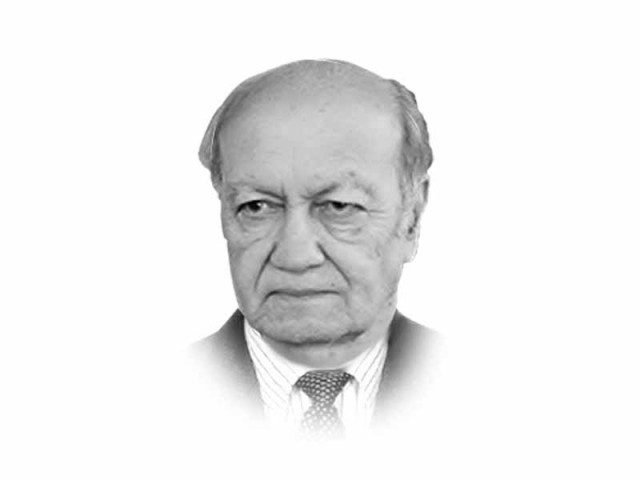Taking a cue from the Koreans
Can the recent positive international developments provide an incentive

The writer is a retired lieutenant general of the Pakistan Army and a former federal secretary. He has also served as chairman of the Pakistan Ordnance Factories Board
There is plenty of skepticism in certain quarters, especially in the US about Leader Kim’s real intentions. They are not clear about what does he imply when he talks of complete disarmament of the region. Equally unclear is President Trump’s position. His demands may be too one-sided that the North Korean leader may find unacceptable. Even if we do presume that something positive would emerge being in the larger interest of both countries and the region, it would be a long drawn process stretching over several months and beyond.
Another major development last week was Prime Minister Modi’s informal summit with President Xi in the picturesque city of Wuhan. It is generally believed it was a serious attempt by leaders of the two neighbouring nuclear powers to improve their countries’ relationship on the basis of mutual trust and good neighbourliness. The China Daily which often represents the official viewpoint mentioned that the “two leaders would focus apart from other issues on matters related to global governance and common international challenges.” It is obvious that China and India are giving greater weightage to how they can cooperate for the common good than to expend their national effort in strategic competition. India having established a strong economic and strategic relationship with the US is interested in widening its reach and influence by moderating relations with China and maintaining historical closeness to Russia. It is also possible PM Modi is realising that the global power centre is gradually shifting towards China and Asian countries in which India would be a major player. This realignment of forces in the next decade or beyond would allow far greater freedom for strategic manoeuver. For Modi stability in Sino-Indian relations will be helpful as India goes for elections in 2019, so that he could claim success not only in his economic policies but also as a responsible leader in stabilising relations with China.
Already the bilateral trade between China and India is flourishing and if presuming they are also able to improve their political relationship would it modify India’s behaviour towards Pakistan as well? In all probability it would. A glimpse of this trend we are witnessing in the Shanghai Cooperation Organisation where India and Pakistan both as members are going to participate in a joint military exercise with Russia.
In sharp contrast, the world is witnessing some dangerous power play in the Middle East between Iran and Saudi Arabia placing Muslim countries and Pakistan in particular in a difficult situation. Pakistan realising the importance of Iran as an important neighbour and having a large Shia population prefers to play neutral. But in reality since the Iranian revolution in the late ’70s, Pakistan has leaned more towards Saudi Arabia. Pakistan’s proximity to Saudi Arabia is influenced by strong affinity of our people and leaders to Islam’s holiest places. It is further reinforced by security considerations of the military and political leanings of the PML-N government.
In Pakistan continuous targeting of Shias and especially the Hazara community by extremist militant groups should be a matter of deep concern for the government and security organisations.
The sectarian divide in the Middle East apart from its deleterious effects on the Muslims in general has benefited Israel the most. Palestinians’ just struggle for an independent homeland has fallen by the wayside, as Arab countries have preferred to befriend Israel to counter Iran rather than support the Palestinian cause.
The sectarian hostility has destroyed Yemen and is playing havoc in Syria, giving space to major regional and global powers for advancing their narrow vested interests at the expense of the people of this region. There is hardly a Muslim country that one could categorise as an embodiment of progress and stability. Can the recent positive international developments provide an incentive to them to also take bold diplomatic and political initiatives?
Are India and Pakistan prepared to shed their 70 years of baggage to develop a more functional and amiable relationship. Is Pakistan prepared to fully satisfy the world that it no more relies on the use of proxies? Similarly, is India prepared to dismount from the high horse, abandon its antagonistic policy and engage politically with Pakistan? If after about six and a half decades of intense hostility the two Koreas are willing to talk. And the American president who until recently was threatening to wipe North Korea out of existence would be engaging in dialogue with impulsive Kim, why not the Indians and Pakistanis?
Published in The Express Tribune, May 2nd, 2018.
Like Opinion & Editorial on Facebook, follow @ETOpEd on Twitter to receive all updates on all our daily pieces.













COMMENTS
Comments are moderated and generally will be posted if they are on-topic and not abusive.
For more information, please see our Comments FAQ